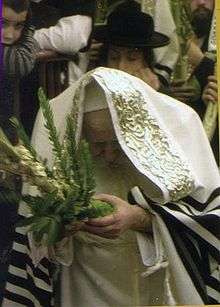Psalm 116
Psalm 116 is the 116th psalm of the Book of Psalms.[1] And the fourth psalm in the “Egyptian Hallel”.[2]
Language
Psalm 116 is without a title in the Hebrew.[3] The psalm was translated into the Greek Septuagint (about 250BC) in Hellenistic Egypt. There is a presence of Aramaisms in the psalm which has been interpreted by a few as evidence of a late date,[4] though this is not definitive. The psalm draws heavily from other psalms so much so that Hupfeld called it a `patched-up psalm'.[5]
Structure
Some Christian churches follow the chapter divisions based on Septuagint, where verses 1-9 is Psalm 114 and verses 10-19 is Psalm 115. This is adopted by both Greek Septuagint (250 B.C.) and the Latin Vulgate (A.D. 400).
Authorship
Theodoret applies this psalm to the distresses of the Jews in the times of the Maccabees under Antiochus Epiphanes[6][7] while a small minority ascribe it to Hezekiahs, sickness recorded in Isaiah 38[8]
However, most commentators today ascribe it to King David. If David were the author, it is not certain whether it was composed upon any particular occasion,[9] or upon a general review of the many gracious deliverances God had wrought for him, out of six troubles and seven[10] The Syriac Church hold it was written on the occasion of Saul coming to the cave where David was hiding[11]
Uses
Judaism

- Is one of six psalms (113-118) of which Hallel is composed. On all days when Hallel is recited, this psalm is recited in its entirety, except on Rosh Chodesh and the last six days of Passover, when only verses 1-11 are recited.[12] The word hallel means "praise." Since ancient times the Egyptian Hallel has been used in the celebration of Passover.[13]
- Verse 13 is part of Havdalah.[14]
New Testament
The Psalm was quoted by Saint Paul in 2 Corinthians 4: 13.[15]
Syriac Christianity
The Syriac church apply it to converts coming into the church.[16]
Roman Catholic
The Psalm has been used as public Prayer by Pope John Paul II, who called it a "Prayer of thanksgiving to the Lord[17][18] The Psalm is used in the Rule of St. Benedict, of Benedict of Nursia.[19][20] However, Psalm 117 is now read in the Liturgy of the Hours.[21]
Protestant Christianity
Henry calls it a thanksgiving psalm,[22] while Spurgeon saw it as A Psalm of Thanksgiving in the Person of Christ. "[23] David Dickson, wrote "This Psalm is a threefold engagement of the Psalmist unto thanksgiving unto God, for his mercy unto him, and in particular for some notable delivery of him from death, both bodily and spiritual.
Musical settings
- Anton Bruckner—Psalm 114 Alleluja! Liebe erfüllt mich WAB 36 (1852)
Notable Verses
- Verse 11, "In my haste I said all men are liars", can be read as an early statement of the liar paradox.
This verse has also been translated "I said in my fear, Every man is a liar." and "In an ecstasy of despair, I said, the whole race of man is a delusion." Some take the word חפז, (chaphaz) to denote haste or flight rather than fear while Horsley translates the verse as 'an ecstasy of despair.[24]
- I will sacrifice the sacrifices of praise
- The cup of salvation this phrase has been ussed by Catholics as prophetic of the eucharist. While some see this as similar to the modern Jewish ceremony held every year in commemoration of the deliverance of their ancestors from the bondage of Egypt. Others see this portion as reference to morning drink offering in the Solomons temple under Mosaic law (Numbers 28:7), inferring the writer is now making an offering of thanks for being delivered.
Others think the verse may have inspired Jesus[25] at the last supper or Pauls “the cup of blessing,”[26]
References
- ↑ Derek Kidner, Psalms 73–150, Tyndale Old Testament Commentaries (Downers Grove, IL: InterVarsity Press, 1975), 411.
- ↑ William D. Barrick, Psalms, Hymns, and Spiritual Songs:The Master Musician’s Melodies. (Placerita Baptist Church, 2007).
- ↑ Calvin's Commentaries, Vol. 11: Psalms, Part IV, at sacred-texts.com
- ↑ Coffman's Commentaries on the Bible.
- ↑ Coffman's Commentaries on the Bible.
- ↑ psalm 116, John Gill’s Commentary of the Whole Bible.
- ↑ John Gill’s Exposition of the Bible.
- ↑ Calvin's Commentaries, Vol. 11: Psalms, Part IV, at sacred-texts.com
- ↑ Jerome Creach, Commentary on Psalm 116.
- ↑ Psalm 116, Matthew Henry's Commentary.
- ↑ Adam Clarkes Bible Commentary - Psalms 116].
- ↑ The Complete Artscroll Siddur page 636
- ↑ Jerome Creach, Commentary on Psalm 116:1-2, 12-19.
- ↑ The Complete Artscroll Siddur page 619
- ↑ Pope John Paul II’s Commentary/Meditation on Psalm 116:10-19
- ↑ John Gill’s Exposition of the Bible.
- ↑ Pope John Paul II’s Commentary/Meditation on Psalm 116:10-19.
- ↑ Commentary on Psalm 116.
- ↑ D’après le Complete Artscroll Siddur, compilation des prières juives.
- ↑ traduction de Prosper Guéranger, Règle de saint Benedîct, Abbaye Saint-Pierre de Solesmes, réimpression 2007) p. 47,
- ↑ Le cycle principal des prières liturgiques se déroule sur quatre semaines.
- ↑ Psalm 116, Matthew Henry's Commentary.
- ↑ Charles H. Spurgeon, Psalm 116, Treasury of David.
- ↑ Calvin's Commentaries, Vol. 11: Psalms, Part IV, at sacred-texts.com
- ↑ Luke 22:17.
- ↑ 1Co 10:16.